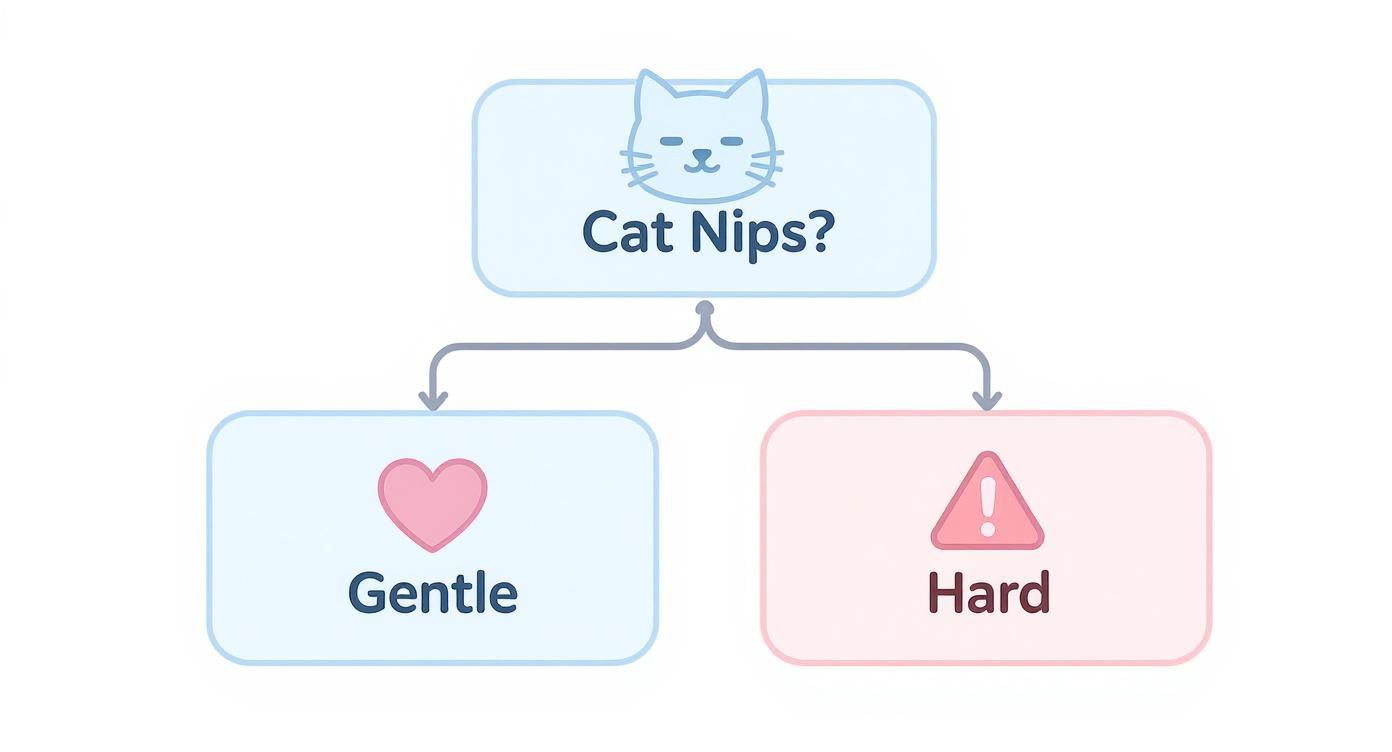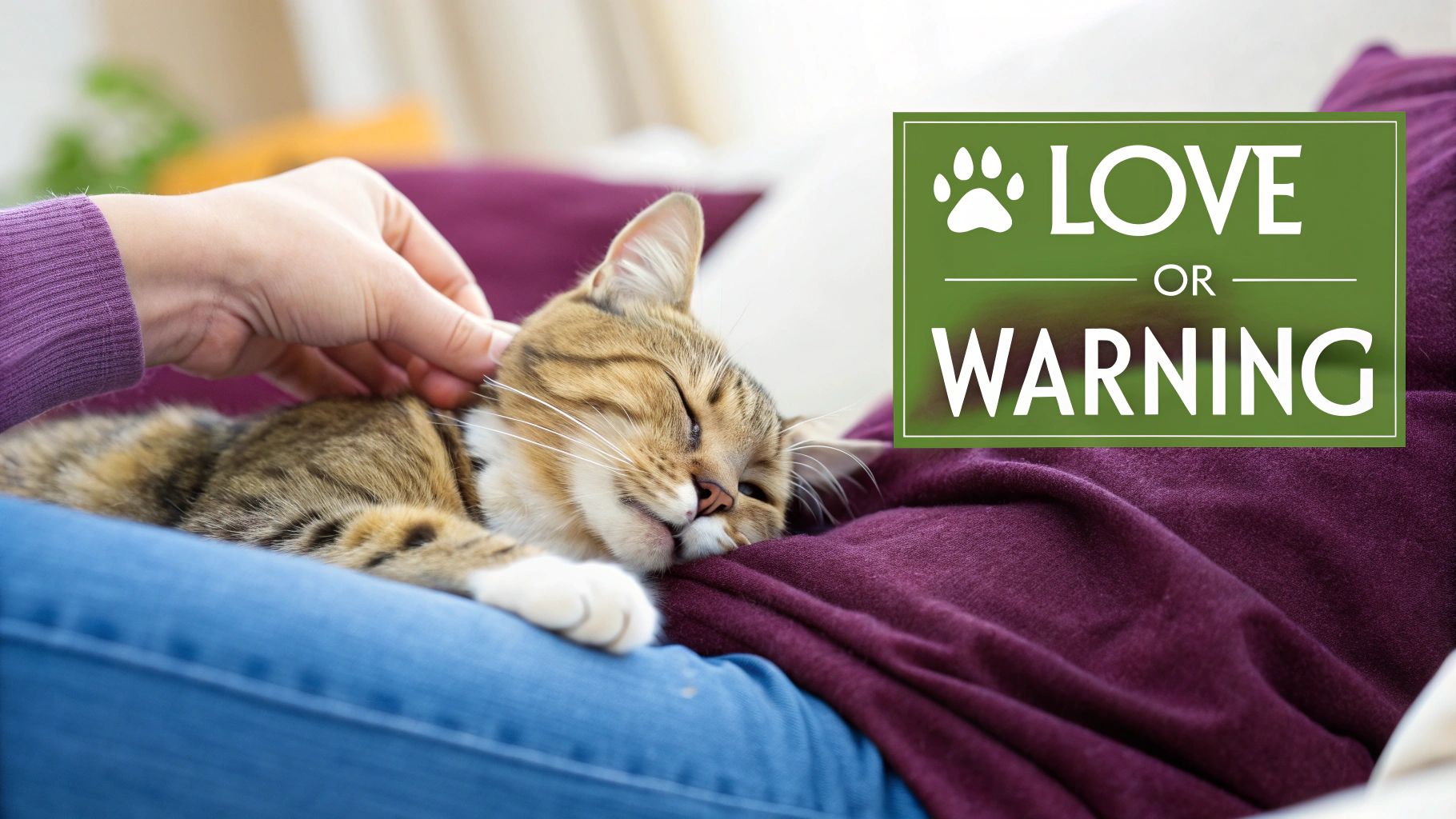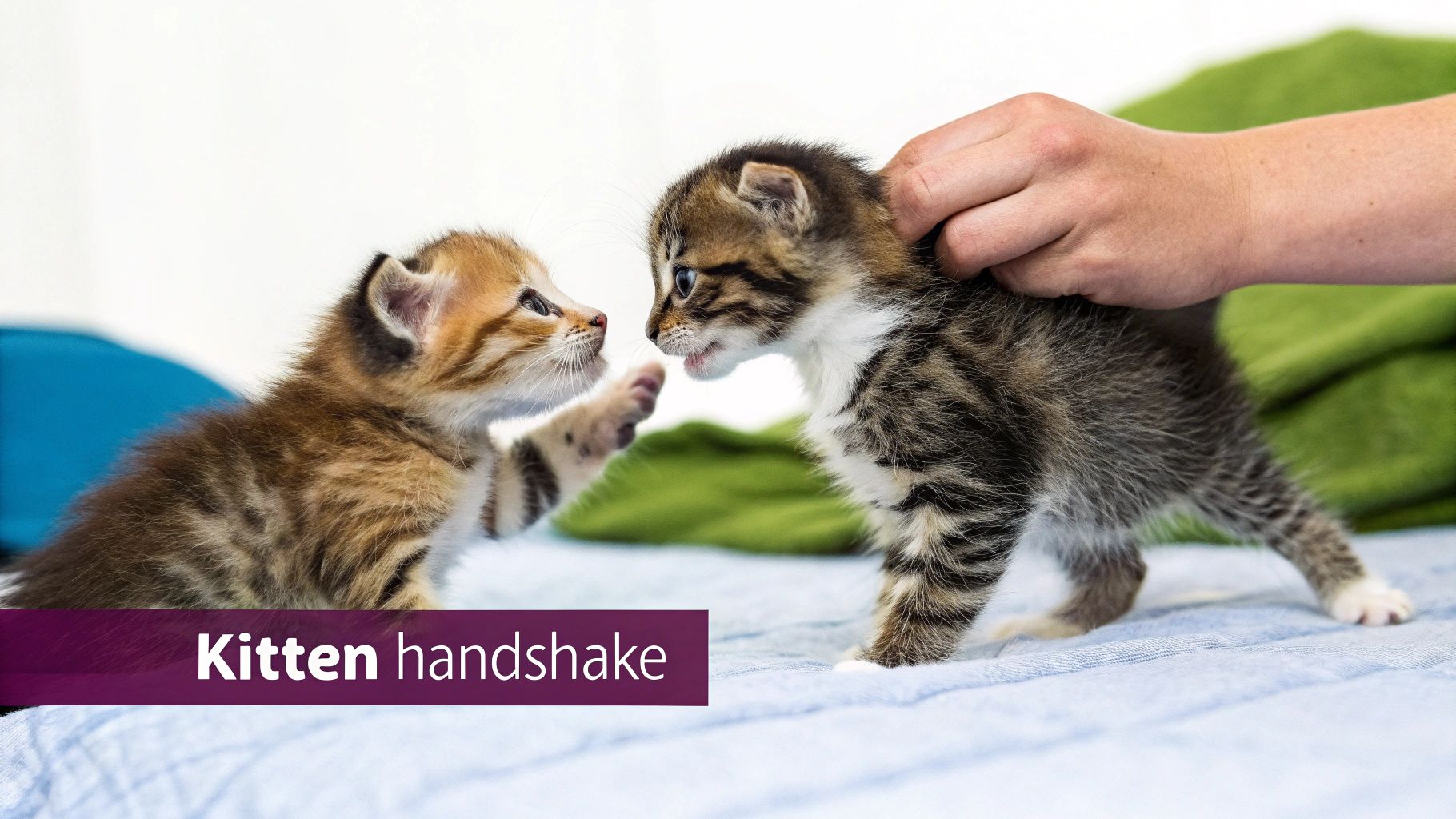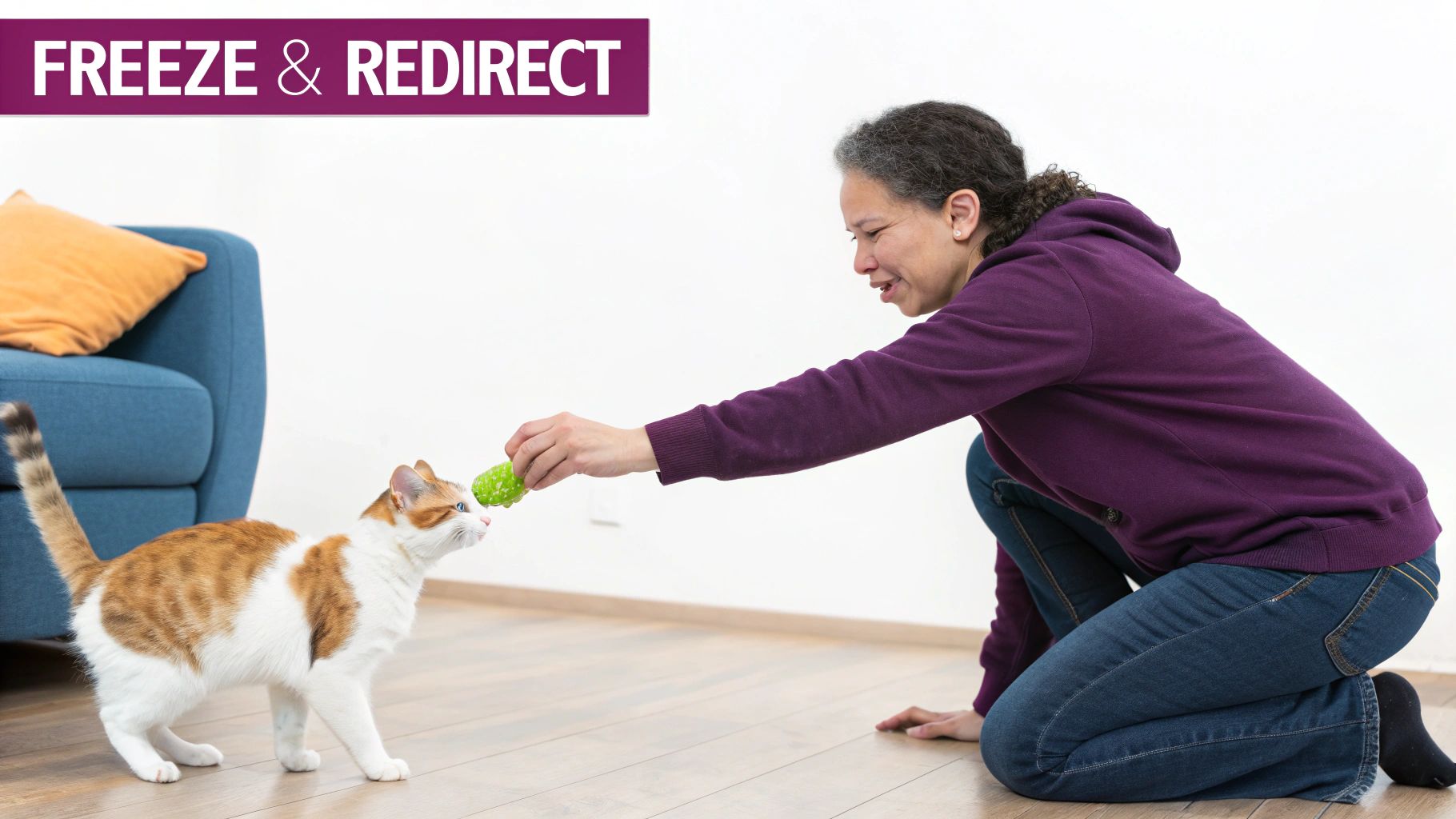Why Do Cats Give Love Bites? A Guide to Feline Affection 😽

One minute you're deep in a purr-fect cuddle session, the next you feel a gentle, surprising little nibble on your hand. What gives? 🤔
Welcome to the confusingly cute world of cat love bites! 😻 Our mascot Floofie calls these little nips the "secret feline handshake." They're a classic form of cat communication, and they can mean anything from deep affection to a polite request to please stop petting.
Decoding Your Cat's Affectionate Nips
Ever wondered why do cats give love bites? It's one of their most endearing yet baffling quirks. Think of it as your cat's unique way of saying, "I love you, you're my favorite human," or maybe even, "That's enough for now, pal."
Understanding this behavior is key to building an amazing bond with your furry bestie.
It's super important to know that these little nips are completely different from aggressive biting. Love bites are a distinct behavior, usually involving just a little pressure rather than a forceful chomp meant to cause harm. A real bite often comes with warning signs like flattened ears or hissing, but love bites are typically part of a relaxed, social bonding moment.
Love Bite Or Warning Sign?
So, how can you tell the difference between a loving nibble and a real warning? It all comes down to their body language and the context of the situation. A happy, purring cat giving you a soft nip is worlds away from a tense cat with a twitching tail.
For a deeper dive into all the reasons behind your cat's nibbling habits, check out our full guide on what it means when cats nibble you.
This handy little infographic breaks down the signals to help you interpret what your cat is trying to tell you.

As you can see, the key is observing your cat’s overall vibe. Is the nip gentle or hard? Relaxed or tense? Learning these cues ensures every interaction stays paws-itive and sweet. 🐾
The Kitten Connection: From Littermate To Lap Cat

To really get to the bottom of love bites, we have to rewind the clock to your cat's kitten days. 🐾 A lot of this nipping behavior is a deeply ingrained instinct, learned way back when they were just a tiny furball tumbling around with their siblings.
Kittens spend their days wrestling and play-fighting. These adorable little scuffles are actually serious business, teaching them vital life skills. Through those gentle bites, they figure out social boundaries and get to practice their pounce-and-capture hunting moves. Our mascot Floofie calls it the "secret kitten handshake"! 😉
So, when your cat gives you a soft nibble, they're often just re-enacting that early social play with you—their favorite (and weirdly giant) littermate.
It's All About Family Bonding
It isn't just about playtime, though. Mother cats groom their kittens using a combination of licks and gentle nips. This is one of the primary ways they show affection, keep their babies clean, and strengthen that family bond. For a cat, this grooming is the ultimate sign of care and belonging.
When your cat mimics this action on you, it's a huge compliment! They're pretty much saying, "You're my family, and I'm going to groom you with my teeth to prove it."
This learned behavior from kittenhood is a powerful form of communication. It shows that your cat feels safe, comfortable, and deeply bonded with you, seeing you as a trusted member of their pride.
Cats who were separated from their mothers or siblings too early can sometimes be a bit more "mouthy," simply because they missed out on some of those early lessons in bite inhibition. As we see this special bond grow between a kitten and their human, it's no wonder so many pet parents choose to celebrate their furry friends in unique ways, sometimes even with personalized pet necklaces.
When Petting Becomes Too Much To Handle

Have you ever been in the middle of a perfect cuddle session when, out of nowhere, your cat nips your hand? It’s not because they suddenly decided they don't like you! Think of it like being tickled—it’s amazing at first, but after a minute, it can become totally overwhelming. 😵
This is a classic case of petting-induced overstimulation. A cat's nervous system is incredibly sensitive. What starts as a wonderful, soothing sensation can quickly morph into sensory overload for them. That unexpected nip is just their way of saying, "Okay, human, I love you, but that's enough for now!"
Learning to read these signals helps prevent misunderstandings and keeps everyone happy. While most nips are just communication, it's worth knowing that a huge percentage of reported cat bites happen when a cat feels provoked, even if we don't mean to. In fact, CDC data shows that about 89.4% of cat bites were provoked, which really highlights how important it is for us to get their signals right. You can learn more about these cat bite statistics from the CDC report.
Becoming a Cat Body Language Expert
The great news is that cats almost always give you a heads-up before they reach their limit. You just have to know what to look for! Our pal Floofie says it's like learning a secret feline code. 🕵️♀️
Keep an eye out for these subtle clues that the petting party is winding down:
- A Twitching Tail: A slow, gentle swish can quickly become a sharp, twitchy thump-thump-thump against the couch.
- Rippling Skin: You might see their skin "ripple" or twitch along their back—a sure sign their nerves are firing on all cylinders.
- Ears Turning Back: Their ears might start to swivel backward or flatten out to the sides, shifting from relaxed to annoyed.
- Sudden Stillness: They might abruptly stop purring and their body will go tense. That's a clear sign they’re no longer feeling the love.
By recognizing these early warning signs, you can stop petting before your cat feels the need to nip. This simple act builds immense trust and strengthens your bond, showing your cat you respect their boundaries.
When you see these signs, don't just stop—redirect that pent-up energy! Instead of another pat, try tossing them one of our awesome interactive cat toys. This brilliant move turns a potential nip into a super fun playtime, keeping your hands safe and your kitty happy. 🎉
How To Respond When Your Cat Gives Love Bites
So, your cat just tagged you with a gentle love bite. What now? 🙀 Your reaction in this very moment is a powerful training tool that will absolutely shape their future behavior. The golden rule is to never, ever punish your cat or yank your hand away.
It's tempting, we know! But sudden, fast movements can kick their natural prey drive into overdrive, basically turning your hand into the most exciting mouse they've ever seen. This makes them want to bite down even harder. Instead of scolding, think positive redirection. It's a much more effective way to teach them what you want them to do.
The Freeze and Redirect Method
The best response is a simple two-step technique that our own mascot, Floofie, fully endorses: freeze and redirect.
The second you feel their teeth, stop all movement. Go completely still. This immediately makes your hand boring and sends a clear signal that the fun stops the moment teeth get involved.
Once they let go, slowly and calmly offer them an appropriate alternative. A sturdy toy is the perfect new target for all that playful energy.
This method clearly communicates a simple rule: "Hands are for gentle pets, but toys are for biting and rough play." It turns a confusing moment into a positive and effective training opportunity.
Here’s how to nail the redirection every time:
- Offer a Distraction: Gently slide a toy in front of them as a better option. One of our catnip-filled kicker toys is purr-fect for this since it's designed to be wrestled with.
- Reward Good Choices: When they switch their attention to the toy, praise them! Learning about the best cat treats for training can give you some great tools for rewarding this positive swap.
- Know When to Ask for Play: Sometimes, those little nips are just their way of asking for your focus. If you need tips on positive ways to interact, learn more about how to get a cat's attention without inviting nips into the conversation.
When Gentle Nips Signal A Deeper Issue

While most love bites are just your cat's quirky way of chatting, it's super important to know when a nip might be a red flag. 🚩 If your usually gentle cat suddenly starts biting more often or with more force, they could be trying to tell you something serious is wrong.
A sudden shift in behavior always deserves a closer look. More often than not, underlying health issues are the real culprit when a sweet cat turns grumpy. Think about it from their perspective—if their mouth hurts from dental problems or their joints are screaming with arthritis, being petted could actually be painful. That bite might just be a desperate plea for you to stop.
When To Call The Vet
If you notice a sudden change in your cat's biting habits, your best bet is to schedule a check-up with the vet. Catching potential problems early is everything when it comes to keeping your fur baby happy and healthy. Biting can also be tied to stress, and our guide on how to reduce cat anxiety has some great tips for creating a more peaceful home.
A sudden increase in biting, especially when paired with other behavioral changes like hiding or loss of appetite, should never be ignored. It's your cat's primary way of communicating physical distress.
An Unexpected Link To Human Health
Here's where the story gets really interesting. Researchers have actually found a surprising link between people who get bitten by cats and depression. One large-scale study found that a whopping 41.3% of people treated for cat bites also had a depression diagnosis.
This doesn't mean your cat's bites are causing depression, but it does highlight how intertwined our well-being is with our pets'. You can discover more about this fascinating link between cat bites and depression. It’s a powerful reminder that taking care of our pets often means taking better care of ourselves, too.
Still Puzzled by Love Bites? Let's Clear Things Up
Got a few more questions about why your cat gives you those little nips? You're definitely not alone. It’s one of the most misunderstood feline behaviors out there.
Let's tackle some of the most common questions cat parents have.
Why Does My Cat Bite My Nose or Chin?
When your cat gently nibbles on your face, take it as the ultimate compliment! This is a huge sign of trust and deep affection.
Cats often groom each other in hard-to-reach spots as a way to bond. By giving you tiny love bites on your nose or chin, they're basically treating you like another cat—a very, very loved member of their inner circle. 🥰
Should I Stop My Cat from Giving Love Bites Completely?
Not necessarily! If the bites are soft, gentle, and part of a loving moment, there's no harm in it. It's a perfectly natural way for your cat to communicate with you.
But, if the nips start getting a little too sharp or happen when you'd rather they didn't, that's your cue to use the redirection tricks we talked about earlier. The goal is to teach them that your hands and face are for gentle pets, while toys are for roughhousing. It's super helpful to keep a fun Floofie-approved wand toy nearby for exactly these moments.
Remember, you're not trying to punish the behavior—you're just guiding it. Think of it as teaching your cat the "rules of engagement" for playing with their much softer human family.
Is It a Sign of Dominance When a Cat Bites Me?
This is a really common myth! Unlike dogs, cats don't really operate with a strict dominance hierarchy, especially not with their humans. A gentle love bite is almost never a power play.
Instead, think of it as your cat trying to tell you something. They might be saying:
- "I adore you so much!"
- "Okay, that's enough petting for now, I'm getting overstimulated."
- "Hey! Let's play! I'm feeling spunky!"
Once you understand why do cats give love bites, you'll see it's all about connection, not control.
Why Does My Cat Bite Me and Then Lick Me?
Ah, the classic bite-and-lick combo! This move comes straight from a cat's grooming playbook. The little nibble is like their way of "loosening up" fur (or, in your case, skin) before giving it a good, cleaning lick.
It’s a behavior they learn as kittens from their moms, and it’s a massive compliment. Floofie calls this the "kitty spa treatment," and it means your cat feels incredibly safe and bonded with you. It’s their ultimate show of care. 💖
Here at FloofChonk, we celebrate every quirky, adorable thing our cats do. From figuring out their mysterious love bites to finding the perfect gear to show off your cat-loving style, we've got you covered. Check out our collection of apparel, accessories, and toys to bring a little more purr-fection into your life! Explore the FloofChonk collection today!
